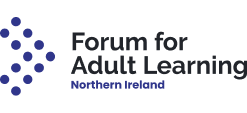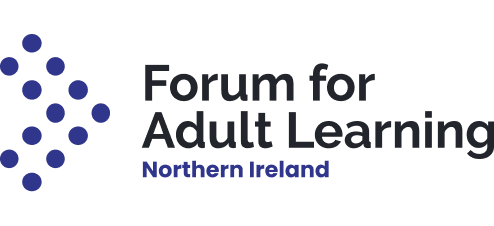FALNI will be making a response to this critical consultation and hopes that as many of you will make a response as well, particularly to highlight issues around lifelong/adult learning.
Below are a number of points that we shall be making and it would be great if you could incorporate some of these into your own responses. We know each of you will have your own particular slant/issues that you will want to present, but the more often central issues around adult learning provision are made the better and will strengthen all our causes.
If you have any queries about what we have said, please contact colin.neilands@falni.org
- FALNI (Forum for Adult Learning NI) welcomes the inclusion and prioritisation of creating a culture of lifelong learning. In particular we support Proposed Commitment 15 and looks forward to working with DfE in the development of a lifelong learning project and action plan.
- FALNI is currently working with its members towards an online autumn conference and subsequent report on creating a culture of lifelong learning in NI. We will invite DfE officials to the conference and look forward to later discussing our report and how it might help shape the proposed lifelong learning project and action plan.
- We feel that the consultation paper would benefit from the inclusion of a definition of lifelong learning. The following comes from UNESCO’s Institute for Lifelong Learning (https://uil.unesco.org/fileadmin/keydocuments/LifelongLearning/en/UNESCOTechNotesLLL.pdf):
In essence, lifelong learning is rooted in the integration of learning and living, covering learning activities for people of all ages (children, young people, adults and the elderly, girls and boys, women and men) in all life-wide contexts (family, school, community, workplace and so on) and through a variety of modalities (formal, non-formal and informal) which together meet a wide range of learning needs and demands. Education systems which promote lifelong learning adopt a holistic and sector-wide approach involving all subsectors and levels to ensure the provision of learning opportunities for all individuals. (p2)
Another useful quote comes from the OECD Skills Outlook 2021:
Lifelong learning does not involve clear learning paths to a well-defined destination. It is a process that guides and helps individuals navigate a reality in which the goal is continually redefined because of a changing world. (p25)
- We understand that within a Skills Strategy the focus will naturally fall on those of employment age and on the economic benefits of lifelong learning. However, as can be seen from the above definitions, a full lifelong learning action plan would cover the whole lifespan and also focus on the wider benefits of learning in terms of health and wellbeing, social integration and cohesion, etc. for which considerable evidence is available.
- FALNI’s ideal would be that creating a culture of lifelong learning would form part of a Programme for Government. In the meantime, we feel that DfE’s proposed action plan on lifelong learning should offer other departments a model that they could follow, since lifelong learning impacts on a very wide range of government objectives. We would be happy to work with other departments to assist their development of such plans,
- We agree that there have been many successful schemes for adult learners through HE, FE and the VCSE sector and with the conclusion that the ‘diffuse nature of these interventions’ (p60) has been detrimental to greater impact. A clear, shared vision will certainly help to unify such initiatives, but it will need to be accompanied by commitment to collaboration across providers, recognising the strengths of each, by co-designed operational plans and by funding that will enable the mainstreaming of successful programmes and resources. FALNI members are looking at creating a vision for lifelong learning in NI and thoughts on this will be presented at our autumn conference.
- We would contend that best practice in engaging the ‘hard to reach’ has already been developed time and again through short-term projects, many based in VCSE organisations, and often with funding from non-governmental sources. However, the fruits of this investment are too often lost as few groups are able to mainstream the developments. Furthermore, there is no central resource to bank this learning and resources so that others might benefit. This is a role that FALNI could undertake and we look forward to discussing this with DfE.
- We were pleased to hear at the DfE consultation events that there will be places on the new Skills Council for representatives of the VSCE sector – a welcome recognition of the sector’s contribution to skills and lifelong learning. More data needs to be collated on provision from the VCSE sector so that its role can be properly assessed. recognised and supported. FALNI is about to embark on research that will be the first comprehensive survey of community education in Northern Ireland: we will be supported by our colleagues in AONTAS who published their first survey earlier this year (https://www.aontas.com/assets/resources/AONTAS-Research/AONTAS_CEN_Census_REPORT_FINAL.pdf). This resource should assist DfE in its consideration of future support for the sector.
- The Dept will require regular data on the uptake of learning to gauge progress in increased participation rates. DfE should consider investing in the Learning and Work Institute’s annual survey of participation in adult learning to increase its coverage of NI (see https://learningandwork.org.uk/what-we-do/lifelong-learning/adult-participation-in-learning-survey/).
- We welcome the recognition of the importance of the family in creating a culture of lifelong learning. DfE could look at the investment made in Family Learning in other parts of the UK https://learningandwork.org.uk/resources/research-and-reports/family-learning-works/
- We welcome the Strategy’s proposals for the removal of barriers to participation (e.g. the expansion of childcare support) and would offer the following also for consideration:
- the introduction of individual learning accounts which have been successfully developed in Scotland and are being considered for introduction in Wales. We believe that empowering individuals to be in control of their learning development could be a significant incentive to greater participation.
- funding support for those undertaking part-time Levels 1-3 qualifications on a par with those undertaking these qualifications on a full-time basis. Part-time courses are frequently the easiest route back for those with time constraints and this route would be facilitated further if the financial barrier was removed.
- the development of Recognition of Prior Learning (RPL) to complement attainment of qualification through formal learning. The International Labour Organisation states:
In the absence of recognized qualifications, a large proportion of people face severe disadvantages in getting decent jobs, migrating to other regions and accessing further education, even though they might have the necessary knowledge and skills. The Recognition of Prior Learning (RPL) process can help these individuals acquire a formal qualification that matches their knowledge and skills, and thereby contribute to improving their employability, mobility, lifelong learning, social inclusion and self-esteem. (https://www.ilo.org/skills/areas/work-based-learning/WCMS_672345/lang–en/index.htm)
The OECD’s Skills Outlook 2021 states:
Many countries across the OECD region have developed recognition of prior learning (RPL) systems, which are essential to ensure that low-qualified but motivated adults can be engaged in training. (p155)
We are sure DfE are aware of the investment currently being made in RPL in ROI.
- We also welcome the proposals on a review of career guidance and the creation of a consolidated portal. Leading on from the points above on removing barriers for learners, we suggest that consideration needs to be given to mechanisms that would allow easier access by those currently most removed from learning and those with limited digital skills or resources. Partnership with community organisations co-designing such mechanisms would be extremely effective.
- Support for increasing participation in adult learning and creating a culture of lifelong learning must be long-term: effecting cultural change takes years of sustained effort from a broad range of stakeholders. The Skills Strategy offers strong hope for the future of adult learning in NI and FALNI will act as a staunch ally and partner to DfE throughout the coming decade.



Leave a Reply